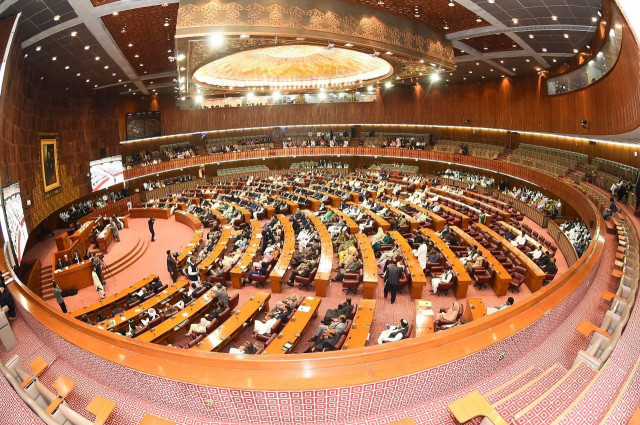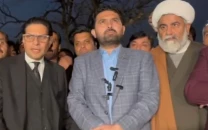The reserved seats’ dilemma
Whatever the ECP decides, matter of allocation of reserved seats to PTI will land in courts

The unexpected victory of PTI-backed independent candidates in the February 8 general elections has left political parties, the establishment as well as the Election Commission of Pakistan (ECP) in a quandary.
The ECP was supposed to issue complete poll results within 14 days after the general elections.
Yet it has not yet been able to decide if it should allot reserved seats to the independent candidates entering the National Assembly under the banner of the Sunni Ittehad Council (SIC). The polls oversight authority has already allotted reserved seats to all other parties.
According to a notification, the ECP has given the PML-N 19 women’s seats and four minority seats.
The PPPP has got 12 women’s seats and two minority seats and the MQM-P has been allocated four women’s seats and one minority seat. Other parties—the JUI-F, the PML-Q and the IPP—have received one seat each.
The ECP has so far notified allocation of a total of 38 reserved seats for women and seven for minorities. It has held back its decision on the remaining 22 women’s seats and three minorities.
Experts also appear to be divided on the question as to whether the PTI backed candidates should be allocated the reserved seats now that they have joined the SIC.
Talking to The Express Tribune, Pakistan Institute of Legislative Development and Transparency (PILDAT) President Ahmed Bilal Mehboob said reserved seats should be allotted to the SIC and, if not, then they should be distributed among other parties.
Mehboob said narrow technicalities such as the requirement of submitting a priority list of candidates for reserved seats prior to election should be dispensed with as a whole new parliamentary party has emerged in the assemblies after such a large number of independent members joined SIC.
In all probability, the PILDAT chief said, the matter will eventually be decided by the Supreme Court no matter which way the ECP decides.
“If the ECP decides against allocating reserved seats to the SIC then the seats which otherwise would have gone to the SIC will be distributed among the remaining parties in each house.”
Though, Mehboob said, there is no specific deadline for the ECP to declare allocation of remaining reserved seats, the ECP was supposed to declare all final results within 14 days of the election–which has not happened.
Renowned constitutional expert Hafiz Ehsaan Ahmad Khokhar stated that a significant change in the distribution of reserved seats occurred during the General Musharraf administration.
This is evident in Articles 51,106, and 224 of the 1973 Constitution, as well as in Section 104 of the Election Act, 2017, and Rules 92, 93, and 94 of the Election Rules of 2017, which address the process of allocating reserved seats to women and non-Muslims.
According to the legal expert, within three days of the names of the returned candidates being published in the official gazette, the returning independent candidates, whether in the National Assembly or a provincial assembly, have to lawfully join a party that already has a parliamentary presence in the relevant assembly.
Later, his or her name is added to the total number of general seats won by the political party for the purposes of reserved seats under Article 51 of the Constitution.
The legal expert clarified that the returned candidates are only permitted to join a political party that already has parliamentary representation in the National Assembly or a provincial legislature.
These independent candidates are not permitted, under Article 51 read with Section 104 of the Election Act, to join political parties that do not have any seat in the relevant assembly.
Even if they so choose, there is no legal or constitutional provision that would bind ECP to assign reserved seats to such a political party.
The constitutional expert said the ECP cannot allocate reserved seats to any other party as it is legally bound to give seats as per the strength of the party concerned in the house, which it already has.
He asserted that a political party must adhere to the election schedule set forth by the ECP in accordance with Sections 57 and 58 of the Election Act 2017 in order to win reserved seats, as well as regular seats.
“Therefore, under Section 104 of the Election Act read with Rule 92, 93, and 94 of the Election Rules, no party is allowed to file a new list of priority lists for women and non-Muslim reserved seats,” he said.
Additionally, Ehsaan said, after the time for filing nomination papers has passed, a political party’s list cannot be changed or altered in any way, including in terms of priority or by adding or eliminating individuals.
In light of Article 51 of the Constitution, a political party may, under the Election Act, 2017 add or increase the number of names through a new list in continuation of the previously filed, provided that the list it had previously submitted prior to the election has been depleted as it won more seats than expected in the relevant assembly or because of the participation or inclusion of independents.
As per the constitutional expert, if a political party neglects to submit a list to the ECP by the deadline specified in the election programme and does not have parliamentary representation, then the Election Act, 2017 prohibits submission of a new list at a later time to allocate reserved seats for women and non-Muslims. This is because the Election Act stipulates that the time for submitting the list has expired.
Ehsaan stated that there is a strong presumption that since this is the first time that a significant number of candidates for the National Assembly and provincial assemblies have been returned to office during the general election and have joined a political party which does not have any seat both in the NA as well as provincial assemblies before joining the independent candidates.
“Consequently, this legal disagreement will wind up in constitutional courts, where they will have to make the first determination about how to interpret Articles 51,106, and 224 of the 1973 Constitution, as well as in Section 104 of the Election Act 2017 and Rules 92, 93, and 94 of the Election Rules 2017.”
He said if a political party fails to submit a list or does not have representation in assembly, then no new list for reserved seats can be submitted on the ground that the independent winning candidates have joined them inside assembly.
“In case major independent candidates are legally unable to join such a political party, which in the present situation arise in the country then the remaining reserved seats after the allocation of proportional seats to other political parties would remain vacant,” he said.



















COMMENTS
Comments are moderated and generally will be posted if they are on-topic and not abusive.
For more information, please see our Comments FAQ